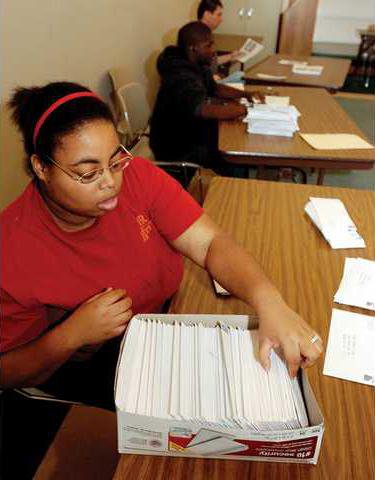For most folks, getting to work means hopping in the car and crossing your fingers in hopes you have enough gas to get there. But for those who are disabled and use wheelchairs, just boarding a bus to go to work can take as long as five minutes. "And that’s if everything works right," said Warren Banks, a bus driver for Rehabilitation Industries of Northeast Georgia. Of the roughly 80 mentally or physically disabled people RING bus drivers take to work every day, several may require wheelchair bus access. With only two wheelchair slots on one bus and one wheelchair slot on another, RING drivers may have to make several trips to get wheelchair- Banks, who is in retirement and has worked for the agency for two years, has banded together with a handful of RING participants in a mission to raise funds for a new RING bus with a wheelchair lift. The group has been meeting on the weekends to mail information out to local businesses in hopes of raising money for the $50,000 bus. Established on Athens Street in Gainesville 33 years ago, RING is a job-training program for people with disabilities. It provides job opportunities for disabled teens and adults so they, too, can become self-sufficient and find personal fulfillment through a career. "I see the difference in these people when they come on the bus," Banks said of new RING workers. "They walk prouder. They talk prouder. Their ability to carry on a conversation is the most amazing I’ve seen come out of that." Having witnessed the pep the program gives to RING workers’ steps, Banks dubbed the fundraising drive for a new bus "Ride with Pride." RING is funded in part by the state and through its contracts its workers fulfill, but the nonprofit agency relies mostly on donations. Three of its current vehicles were donated to RING. The fourth is on its "last leg" and has nearly 300,000 miles on it, Banks said. Roger Swafford is the RING transportation director, and said all four of the agency’s vehicles are driven more than 1,000 miles each week to get program participants to and from work. Because of their disabilities, many RING workers are unable to drive. Others are able to drive but have no access to a vehicle. Four RING bus drivers pick the disabled workers up from their homes as far away as Buford and White, Lumpkin and Jackson counties. RING drivers take the workers — who range from teens to seniors — to their jobs at RING headquarters where they package Wrigley’s gum. Other workers are taken to a medical supply company in Cornelia where they produce surgical thread supplies. Still others are bused to Pendergrass where they repackage Lysol products. RING drivers also provide transportation to job interviews, the Department of Labor and doctor’s visits. Ultimately, RING’s goal is to find employment for disabled workers outside RING system contracts. If needed, former RING workers still can count on RING bus drivers to take them to and from work at their new jobs. At the end of the day, workers are taken home to their families. "We go a lot," Swafford said. "We’re constantly on the move. We put a lot of miles on the vans, so we have to continually keep upgrading because we wear them out." Jenny Black, program manager at RING, said she oversees workers who have had amputations, are blind, hearing impaired or have mental health or physical disorders such as severe autism and cerebral palsy. She said she observes workers’ communication and work skills in the controlled RING environment and then attempts to match some of the more independent workers with jobs they may enjoy in the community. Black said of disabled people who do not begin working before they leave high school, only 20 percent will find jobs in the community afterward. Swafford said that’s why he’s glad to see the Department of Labor and Hall County school system referring more disabled people to RING. Yet a new bus is needed to accommodate the growth, especially for wheelchair-users, Black said. Banks said the Ride with Pride fund is now $2,500 into its $50,000 goal. Black said without a new bus, the program may have to start turning people away. "People waste away when they feel like they don’t have a place in this life or within this world," Banks said.
users to their jobs.
RING reaches out for funds
Group gives job training to people with disabilities

